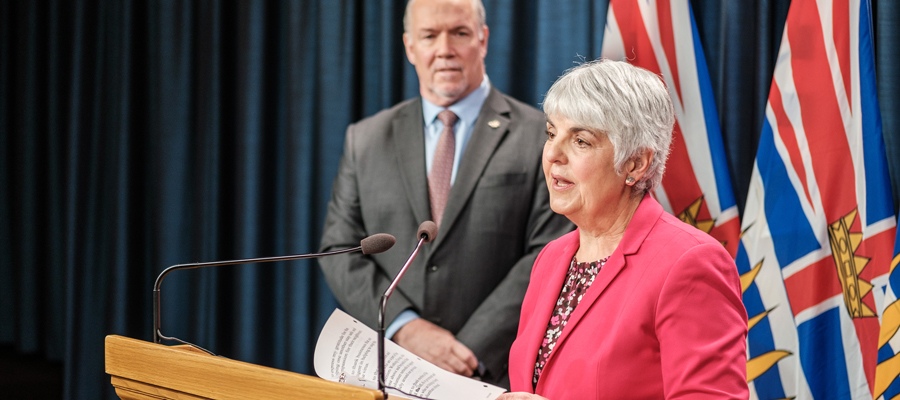Time to #CancelRent and defer mortgage payments

UPDATE
On March 25, the BC government announced a suite of measures to protect renters during the COVID-19 crisis, including a ban on new and active evictions, prohibiting rent increases, and providing a supplement of up to $500 to help cover the cost of rent for those who are losing income due to the crisis. The evictions ban is particularly important, as it ensures no one unable to pay rent on April 1 will lose their housing. But sky-high rents in BC mean that the federal and provincial governments alike will need to take further action—such as the rent cancellation and mortgage deferral measures we outline in our post below in the immediate term—and significantly boosting the income supports already announced to ensure that households can actually meet their needs as we get through this crisis.
As incomes rapidly decline for households amid the COVID-19 crisis, calls for rent cancellations have grown across jurisdictions, including here in BC. As a CCPA report published yesterday shows, over 200,000 renter households in BC have less than one month’s savings on hand. The federal and provincial governments have announced packages to support incomes, but these dollars will not begin to reach households until April and May. With the rent due in a week’s time, urgent action is needed now.
In BC, the provincial government has already moved to halt evictions for non-payment of rent in all government-funded housing, and the Premier has stated that “no one will lose their apartment as a result of COVID-19.” It’s critical that any eviction ban ensure that renters unable to pay in this moment of crisis aren’t penalized—and should not merely delay their evictions until the crisis passes. In the interest of public health, other evictions should also be limited, given it is not possible to “stay home” and look for a new home or undertake a move all at the same time (with some exceptions, though no one self-isolating due to potential COVID-19 symptoms or who has the virus should be subject to eviction under any circumstance).
To ensure that everyone is secure in their home and able to have cash on hand for food and essentials, rent for April 1 should be cancelled without penalty for anyone who attests they’re unable to pay. This could be done using a simple on-line form submitted by renters at risk. By forgiving the rent rather than simply delaying payment, this policy would support renters facing an income crunch during this crisis.
This cancellation of rent payments should come alongside a more robust measure for mortgage payment deferrals. Last week the federal government announced that lenders would be allowed to offer deferred payments for mortgages insured by the Canada Mortgage and Housing Corporation (CMHC). However, it is left up to financial institutions to work out details on a case-by-case basis, and does not apply to non-CMHC insured mortgages.
Lenders should instead be required to allow three to six month deferrals on residential mortgages (including for rental properties) and to extend amortization periods so households can reduce their monthly payments. Lenders should also be prohibited from charging fees for deferrals and loan restructuring, and be required to maintain the interest rate from the original loan or their current posted rate, whichever is less. The federal government should also issue guidelines for what constitutes hardship so that determining eligibility for these measures is not left up to individual banks and other financial institutions.
These mortgage deferrals and restructuring options would help ensure that small landlords are reasonably protected, and would make it easier for financially impacted homeowners more generally to avoid defaulting and contributing to a large-scale housing market crash. Such measures could be paired with a property tax deferral option, alongside the BC Hydro deferral already announced. The provincial government should also make funds available to landlords affected by a rent cancellation to be used for maintenance and other critical operating costs, as others have suggested.
If the federal and provincial emergency income supports are not reaching households quickly enough and remain at inadequate levels, rent cancellation will need to be extended to May. In many European countries, workers’ incomes affected by COVID-19 are being replaced at rates of up to 90%, compared to Canada’s Employment Insurance replacement rate of only 55% up to only $54,000 in insurable earnings, which means a maximum benefit of about $2,300 per month—barely enough to cover average rent for a 2-bedroom apartment in Vancouver. Benefit rates will be even lower for those who will receive stop-gap federal emergency benefits rather than regular EI.
The combined federal and provincial income support efforts should be scaled up urgently. With adequate income support, households would be able to pay their bills again.
We outlined other important housing security measures in our previous post published last week. Income support targeted specifically to low-wage renters will be needed, and one form this could take is a significant expansion of eligibility for the provincial Rental Assistance Program, which provides cash assistance to low-income renters. To ensure no one falls through the cracks, the needed halt on evictions for non-payment of rent should remain in place on an ongoing basis until the social and economic situation stabilizes.
It is also important to highlight that given the long-running homelessness crisis in this province, emergency housing is needed for those without shelter and who cannot self-isolate. This could include requisitioning empty hotel space to provide housing (including appropriate staffing) for people experiencing homelessness, as is currently occurring in jurisdictions like California. Significant increases to income assistance rates are also urgently needed—these are long overdue, and now is the time to finally raise the rates. This is also important given the possibility of a spike in applications for welfare if temporary EI benefits aren’t extended as the economic crisis unfolds.
At a time of society-wide upheaval and anxiety, it’s important to take the stress of housing insecurity off the table. It cannot be left to the goodwill of landlords and banks to provide relief to British Columbians who are struggling. Rent cancellations present some complications, but we’re in an emergency and action is needed now to ensure that renters are secure in their homes and able to afford groceries in April. The rent is coming due in eight short days.
This post is a part of an ongoing research project into affordable housing funded by the Vancouver Foundation
Topics: COVID-19, Housing & homelessness



